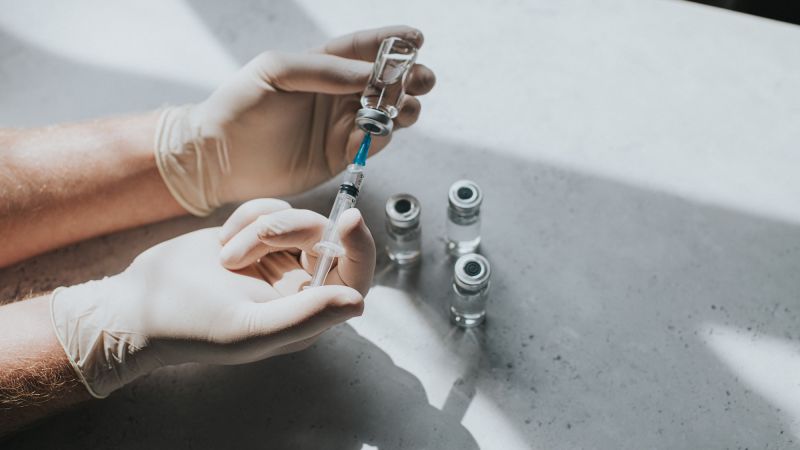COVID-19, Flu, and RSV Vaccination Recommendations This Fall
Covid-19 levels continue to surge in the United States, with flu season rapidly approaching and cases of respiratory syncytial virus (RSV) also beginning to rise. The US Centers for Disease Control and Prevention (CDC) predicts that this year’s respiratory disease season will mirror last year’s, where more than 20 hospitalizations occurred for every 100,000 people in one week at its peak, significantly exceeding pre-pandemic levels.
The CDC has indicated the possibility of a lower disease burden this season, contingent largely on vaccination rates among the population. Last year marked the first time vaccines became available for all three major respiratory viruses: Covid-19, flu, and RSV. Unfortunately, the uptake of these vaccines was low throughout the previous season.
"Our top recommendation for protecting yourself and your loved ones from respiratory illness is to get vaccinated," stated CDC Director Dr. Mandy Cohen. "Make a plan now for you and your family to get both updated flu and COVID vaccines this fall, ahead of the respiratory virus season."
As the season approaches, the CDC advises that everyone aged 6 months and older should receive a Covid-19 vaccine. The virus’s continuous evolution necessitates updated versions of the vaccine, which may offer enhanced protection against severe disease by targeting emerging variants.
In terms of vaccine options, the updated mRNA vaccines from Moderna and Pfizer now target the KP.2 variant, which has been prevalent in the US since May. These vaccines are suitable for individuals aged 6 months and older. Additionally, a traditional protein vaccine from Novavax is available, aimed at the JN.1 variant, which, although still circulating, is less dominant than it was earlier in the year. The Novavax vaccine is approved only for those aged 12 and older.
Despite uncertainty regarding their practical effectiveness, the CDC reports that the Covid-19 vaccines provided 54% protection against symptomatic infection last season, even amid the emergence of new variants. Updated Covid-19 vaccines are already available, but the timing for receiving the shot may vary based on individual circumstances.
Dr. Sandra Fryhofer, a liaison for the American Medical Association to the CDC’s advisory committee, explained, “You have the most protection in the first few weeks to months after vaccination, and after that, antibodies tend to wane.” She emphasized the importance of timing vaccination to have peak antibody levels for significant events but cautioned that delaying vaccination risks infection.
CDC data indicates that protection typically diminishes about four months after receiving the vaccine. For those vaccinated now, this could mean decreased protection during the height of the respiratory virus season. High circulation levels of Covid-19 further underscore that higher-risk individuals, including seniors and immunocompromised persons, should receive their updated doses promptly, ideally at least two months after their last vaccination or three months following a recent infection.
Epidemiologist Katelyn Jetelina advised on her blog that individuals recently infected with Covid-19 might consider waiting up to six months for their updated shot, as this interval may facilitate a more effective update of antibody responses.
The CDC also recommends that everyone aged 6 months and older receive a seasonal flu vaccine, ideally in September or October. Most people need just one flu vaccine each year; however, first-time recipients under age 9 may require two doses spaced four weeks apart. Additionally, there is a higher-dose flu vaccine formulation available for individuals aged 65 and older.
RSV poses particular danger to older adults and young children, with vaccines now available to protect these groups. The CDC issued updated recommendations for older adults, advising that all individuals aged 75 and older receive one RSV shot, along with those aged 60 and older who face increased risk due to chronic medical conditions or living arrangements.
Unlike the Covid-19 and flu vaccines, the RSV vaccine is a one-time dose. Older adults who were vaccinated last year do not need another this year. Pregnant women can receive an RSV vaccine to protect their newborns, or alternatively, antibodies can be administered to infants after birth.
The CDC confirmed that it is safe to receive both Covid-19 and flu vaccines simultaneously. Individuals can administer both shots in the same arm, with at least an inch apart, or in different arms. It is also acceptable for those eligible to receive Covid-19, flu, and RSV vaccines during the same appointment, without any recommended waiting period between them. However, the CDC cautioned that individuals who receive both an RSV and flu vaccine at the same time may experience more injection-site reactions or other side effects.
Though a combination vaccine is not yet available, Moderna announced plans to seek regulatory approval in 2024 for a combined Covid-19 and flu vaccine.
Vaccines are being widely distributed at pharmacies throughout the US, with the federal government offering a vaccine locator tool to help find available doses, though patients are urged to confirm appointments directly with providers. Local health departments and physicians’ offices may also have vaccines, but availability may be more limited.
Parents are advised to consult their pediatricians regarding vaccines for children and young infants. Ongoing challenges from last year, such as age restrictions at pharmacies and limited pediatric supplies, may continue this season.
Most vaccines are covered by insurance plans, ensuring that private insurance, Medicare, and Medicaid beneficiaries can receive vaccinations without out-of-pocket costs. However, a federal initiative that offered free Covid-19 vaccines to uninsured adults has concluded due to lack of funding. As a result, uninsured adults could face a cost of $201.99 for the updated Covid-19 vaccine at pharmacies.
Some areas may still provide free vaccinations for uninsured individuals, as the CDC recently allocated $62 million to state and local health departments for this purpose.












